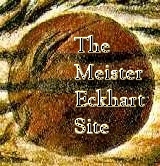|
|
||
 |
Meister Eckhart Home / Works by Meister Eckhart - Quotes / Inspired by Eckhart / Studies / The Papal Condemnation / Mail & Announcements / Links / Books |
The First German Movement In Its European Setting (1270-1350)
Page 6
The first German movement, the very structure of its thought and its religious experience (though not necessarily the conscious intention of its leaders) was directed at the Carolingian-papal authoritarian Church and at the theology of power which it had built up. It was cool and mistrustful of the "unhallowed Empire". The ancient idea of God the King became God the Spirit. The rational-political ordo of the Curia was replaced by nature as guardian of the underground and all that belonged to it. Thomist-Aristotelian logic was overthrown by the dialectics of the Spirit of God and the heart of man. Logical distinctions and separations were blurred in the warmth of the spirit. The offices of pope, emperor, king, natural father and great congregation were denied any real efficacy in salvation. The figure of God the Father was pushed back into the depths of the unnameable Godhead, and Christ the Mediator was succeeded by God the Spirit. Christ's office of mediation had been dishonoured and desecrated by the clergy as had the office of father by pope and king.
The spirit and nature, which displaced the church and the political ordo, were the products of the Neoplatonic tradition. Elements of this fundamental transposition were inherent in the ideas of Albert the Great, and were further elaborated by Dietrich of Freiberg and Berthold of Mosburg [7]. Dietrich, the Dominican provincial for Germany, from 1293 to 1296, was a violent opponent of Thomas Aquinas. With the help of Proclus, Albert and the Arab Neoplatonists, he constructed a typically German view of things: all living and unliving creatures flow out of the divine unity and return into it again. The abyss of the soul is divine in form (abditum mentis); man is deeply rooted in God; in that "ocean of all intellectuality" he beholds God and all that is created [8]. His disciples, Berthold of Mosburg (whose commentary on Proclus influenced Nicholas of Cusa) and Nicholas of Strasbourg, were the transition to Meister Eckhart (d. 1327) [9].
The Eckhart of the Latin tracts displays a limitless capacity to absorb concepts as if a barbarian had filled himself to the brim with ideas from Plato, Aristotle, Plotinus, Proclus, Dionysius the Areopagite, Eriugena, the Arab and Jewish Neoplatonists, Augustine, Albert, Bonaventure, Thomas and Scotus. Although Eckhart was a disciple of Thomas whom he defended against Scotus, he was strongly influenced by the Franciscans. In any case, Eckhart's Thomism was a strange creation. It had none of the safeguards to thought and faith provided by political humanism and the social background of the Italian cities, nor the inner discipline of papal authority. Under these conditions Thomist thought dissolved into a Neoplatonic pantheist monism. It was natural that Eckhart turned to those writings of Thomas in which the Neoplatonic elements were strongest, and it was from them that he arrived at his conviction that God is pure being.
Cf. Meister Eckhart von Friedrich Heer ||| Mail: Heer, Tauler & nazism